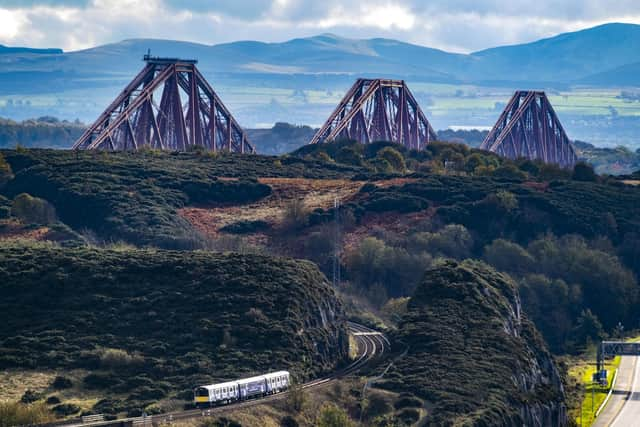Huge ScotRail train orders in pipeline to create all-green fleet
and live on Freeview channel 276
The Scottish Government-owned operator plans to acquire around 150 new electric, battery or hydrogen-powered trains to replace two-thirds of its fleet over the next 13 years.
The move came as a review is about to get underway into the short-term future of ScotRail’s 40-year-old Inter7City fleet, which was involved in the fatal Carmont crash in 2020.
Advertisement
Hide AdAdvertisement
Hide AdThose trains are part of the plan to phase out all of ScotRail’s diesel trains by 2035, which was announced by Transport Scotland two years ago.


The new trains, comprising a total of around 675 carriages, would come in three phases, covering suburban, rural and intercity routes, with the first due to be in service from 2027.
Nine of ScotRail’s 11 train fleets will be replaced, including its older electric trains, with only the newer ones retained.
The new suburban fleet will be ordered over the next year for lines such as Edinburgh to Fife and Tweedbank, and Glasgow-East Kilbride.
Advertisement
Hide AdAdvertisement
Hide AdThey are expected to have taken over the routes, which also include local services around Aberdeen, Dundee and Perth, by 2030.


These 120 electric or battery trains will comprise some 550 carriages.
Battery trains are seen as halving the cost of electrifying lines by reducing the length of overhead power wires needed.
They could recharge over electrified sections and run on battery power for the rest of the route.
Advertisement
Hide AdAdvertisement
Hide AdA second phase will involve trains being ordered in 2024/25 for rural lines such as Glasgow to Oban, Mallaig and Stranraer, and Inverness to Kyle of Lochalsh, Thurso and Wick.
Finally, a new generation of intercity trains would be ordered in 2025/26 for Edinburgh/Glasgow-Aberdeen/Inverness, due to be operating by 2030.
It is not clear how these would be powered, but hydrogen is one option, with a Scottish Enterprise-led research project underway at Bo’ness.
ScotRail service delivery director David Simpson said: “We are aware of our responsibility to help Scotland meet its ambition to be a world leader on tackling climate change.
Advertisement
Hide AdAdvertisement
Hide Ad“That’s why all diesel trains will be taken out of service by 2035 through the decarbonisation of the rail infrastructure.
"Our fleet of Inter7City trains, which operate on routes connecting Scotland’s seven cities, are expected to be replaced by a non-diesel powered train by 2030.”
David Clarke, director for Scotland of the Railway Industry Association, which represents suppliers, said: “This is important for Scotland in improving the quality and reliability of services and in facilitating the decarbonisation programme.
"It will be particularly welcomed by suppliers in providing a rare example of a long-term pipeline and breaking the drought of train orders currently being experienced by UK-based train builders and their suppliers.”
Advertisement
Hide AdAdvertisement
Hide AdMeantime, the first meeting of a Scottish Government-appointed group to review the safety of the type of train involved in the Carmont crash is due to hold its first meeting on August 31.
The Carmont Rolling Stock Recommendations Steering Group will consider train-related safety improvements recommended by the Rail Accident Investigation Branch (RAIB) report into the incident, in which three people died following a derailment caused by debris being washed onto the track.
The report concluded it was “more likely than not that the outcome would have been better if the train had been compliant with modern crashworthiness standards”.
Investigators said they did not regard the trains to be unsafe, but their report made seven recommendations for safety improvements, including stronger “lifeguard” [metal brackets] to better protect the wheels from obstacles, safer window glass, and replacing batteries in carriages that were less likely to catch fire.
Advertisement
Hide AdAdvertisement
Hide AdThe group will be chaired by RAIB founder and former chief inspector Carolyn Griffiths and comprise rail industry bodies and unions.
Transport minister Jenny Gilruth, who announced the review in March, said the group would “ensure we can bring together the right industry stakeholders to address the recommendations made by the RAIB following the tragic events at Carmont”.
She told MSPs she would be assessing when the trains could be taken out of service, but said ScotRail remained “to some extent quite reliant” on them.
Scottish Labour has called for the immediate scrapping of the trains, while drivers’ union Aslef wants them withdrawn by the third anniversary of the crash in August next year.
Comment Guidelines
National World encourages reader discussion on our stories. User feedback, insights and back-and-forth exchanges add a rich layer of context to reporting. Please review our Community Guidelines before commenting.
